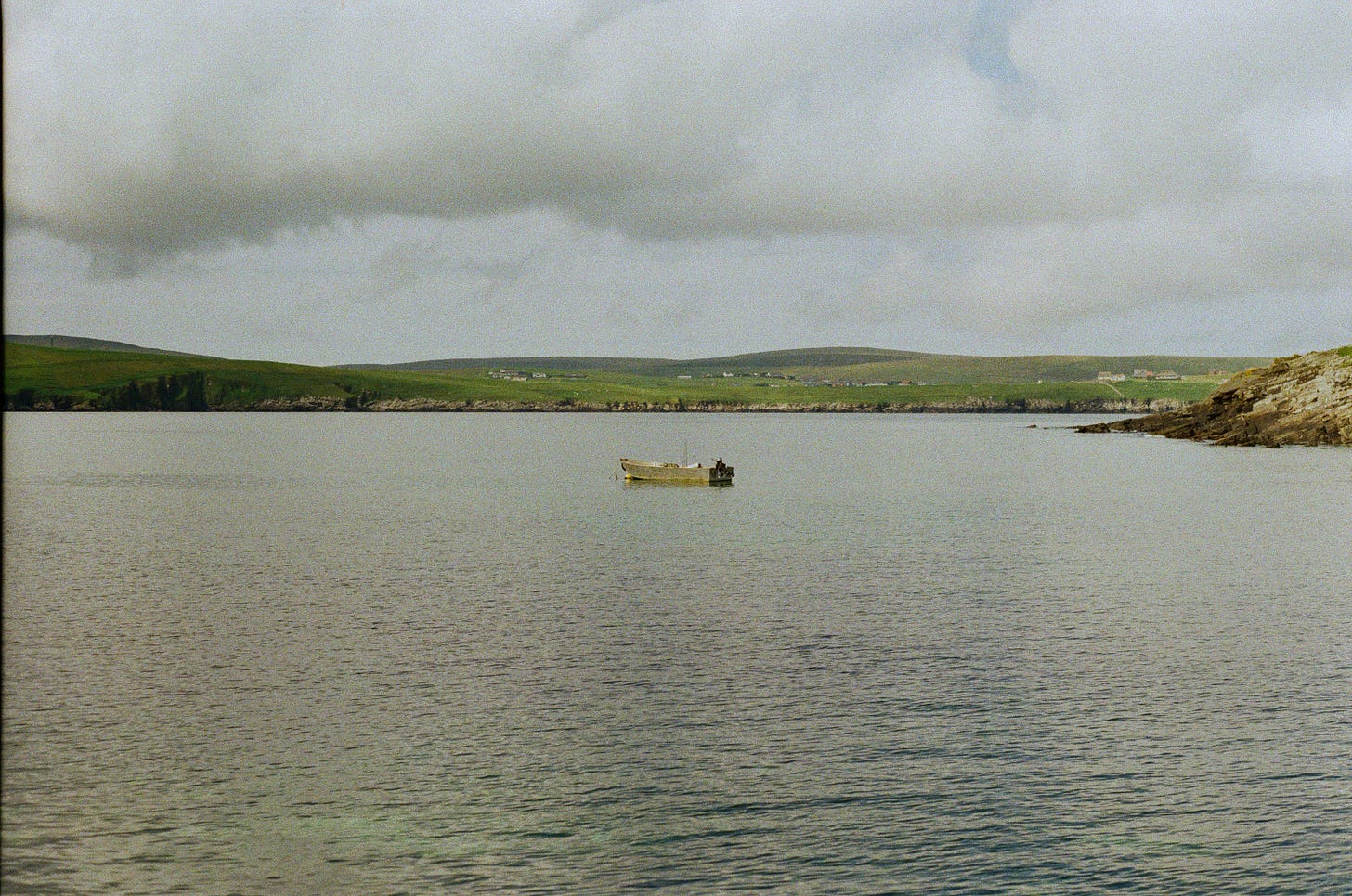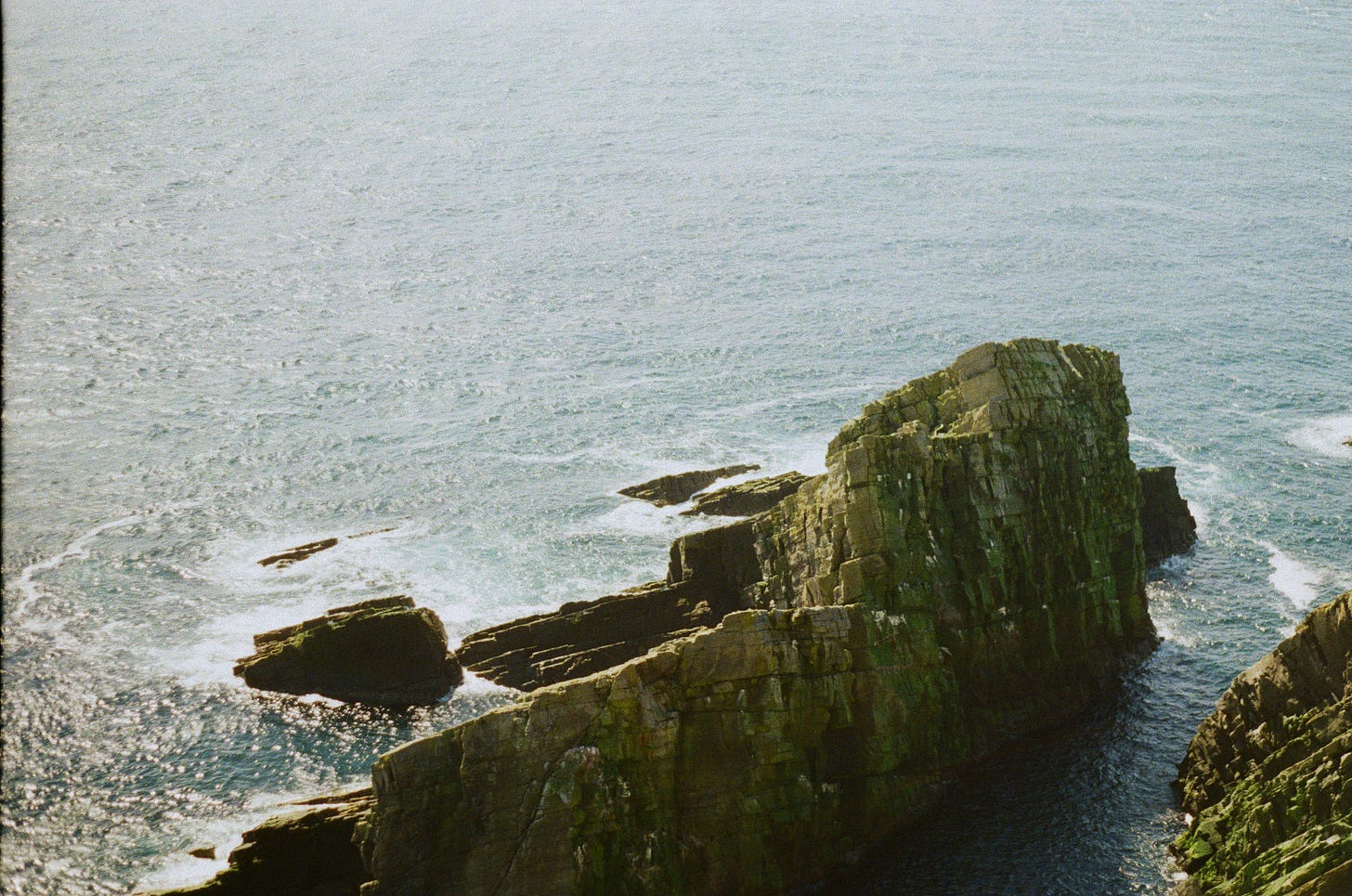I’m nursing a bottle of Skipper’s Ticket pale ale, the gale rocking the offing. I boarded the ferry from Lerwick, on the east coast of Shetland, for Aberdeen; this is a fourteen-hour trip through the temperamental North Sea, so I swallowed a travel sickness tablet and there I sit on an armchair that has been chained to the carpet. The lounge is quiet and most people around me are sitting still, eyes locked on the horizon. This week marks the last stretch of July, the sky powder blue yet as thick as cotton, the light dimming when the sun doesn’t set.
This is a return journey. On the way to Shetland, from mainland Scotland, I read Amy Liptrot’s memoir The Outrun, in which Liptrot recalls the legend of Assipattle and the Mester Muckle Stoorworm. The story features a huge sea monster, ‘so large it could wrap its body around the world and destroy cities with a flick of its tongue’, which was killed by Assipattle, a layabout who stuffed burning peat into the stoorworm’s liver. The fire continued inside the creature’s body and, in pain, the stoorworm knocked its head and lost hundreds of its teeth, which formed the islands of Orkney, Shetland and the Faroe. Then, as it curled up to die, the creature’s body became Iceland, its liver still burning, giving birth to a country of hot springs and volcanoes.
The folktale unsettled me; there was something about the imagery, as haunting as a nightmare about losing my teeth, and my mind began asking what would happen if I died on this ship, suddenly. What would happen to the remains of my body; where would they belong and what would that say about the life I lived? I had to wait to set foot on Shetland, when I picked up enough signal on my phone, to Google ‘what happens if a baby is born at sea’ instead, careful not to tempt fate.
Under the 1961 Convention on the Reduction of Statelessness, ‘a birth on a ship or aircraft in international waters or airspace shall be treated as a birth in the country of the ship or aircraft’s registration.’ In reality, this applies only to births when the child would otherwise be stateless as, in most cases, a newborn would be covered by the country’s jus sanguini, thus be granted the same citizenship as their parents. In the introduction to the treaty, the Office of the United Nations High Commissioner for Refugees (UNHCR) wrote that the proposal forms ‘the foundation of the international legal framework to address statelessness, a phenomenon which continues to adversely affect the lives of millions of people around the world.’ It goes on by quoting the High Commissioner’s call to eradicate statelessness by 2024.
‘The international legal definition of a stateless person is “a person who is not considered as a national by any State under the operation of its law”. In simple terms, this means that a stateless person does not have the nationality of any country. Some people are born stateless, but others become stateless.’ – UNHCR
I re-read this slowly, shaking off what I had taken for granted, and I wonder how many times I have changed into my wetsuit thinking that I could swim my body away. Numb it with cold water, one stroke after the other, until I would liquify and disappear, be anchor-less. Fluid, as free as water. I think about the privilege behind the appeal—the crave—not to belong when I have the safety of returning to a place, either known or unknown, where someone will make me feel like I do. That I will be welcome and that I was born recognised by a state. That my passport grants me access to health care, job opportunities, a right to be a citizen in this world and, at the end of the journey, to be buried with dignity. In a world where borders predicate people’s rights and welfare, who are international laws for?
We arrive at the ferry terminal around 7am. Our car is parked on the lower deck, deep inside the boat’s belly, so we wait in a queue. My legs are shaky after a night spent sitting, sometimes stretching my body but mostly curling up in the fetal position, and my head heavy from the sensual overload of the land. Dogs crawl out of the kennel, suspicious too. L. is driving while I’m passing time on Instagram, scrolling and scrolling, until a post by Palestinian poet Mosab Abu Toha grabs my attention – ‘I’ve just decided to share with you a photo of the most beautiful part of the Mediterranean Sea. It’s Gaza sea.’ Mosab Abu Toha details in the caption that the photo was taken on 10th August 2023.
The sea is timeless but intuitive, a world without a set language, where storms, shades of light and winds inform one’s actions.
‘Here’s the trick:
pretend your mouth is full
of stones.’
From ‘Speaking Shaetlan’, Mother Dy by Roseanne Watt
Shaetlan, the vernacular of the Shetland Islands, has no standardised orthography. It is a ‘form of Scots shaped by sea roads’ (Watt) and mixes English, Lowland Scots and old Norn, which is the extinct Scandinavian language of the Northern Isles. Spelling follows the speaker’s tongue and accent, which will equally send a signal towards where they belong.
Back in Glasgow, there is a pile of unopened posts waiting for us. Among bills and various administrative reminders, I find a parcel that contains Notes from an Island by Tove Jansson and Tuulikki Pietilä. This is a collaboration between Jansson and her life-partner, the graphic artist ‘Tooti’, made of interlinked diary entries and illustrations from the island where the pair retreated to live, paint and write. The island is described as a ‘barren outcrop of rock in the Gulf of Finland’. I already know how the book starts because my best friend had sent me a screenshot from her edition months ago:
‘I love rock – sheer cliffs that drop straight into the ocean, unscalable mountain peaks, pebbles in my pocket. I love prising stones out of the ground, heaving them aside and letting the biggest ones roll down the granite slope into the water! As they rumble away, they leave behind an acrid whiff of sulphur.
(…)
Sometimes we build things to be solid and lasting, and sometimes to be beautiful, sometimes both.’
On a bright day in Shetland, I was told that the sky is infinite. Later, once the fog had descended and enveloped the shore wholly, the clouds melting inside the sea, I couldn’t see a soul. Only my phantoms. And I caught myself thinking that perhaps the earth had an edge, you know, as I climbed up another cliff, I was nervous about what I might or might not find on the other side of it. I wondered when this land would stop and what would begin afterwards — and who would be there to show me the way.
Margaux
PS. If you enjoy this newsletter, feel free to forward it to a friend, or two.
And, if you’ve been forwarded this email, you can subscribe here:









